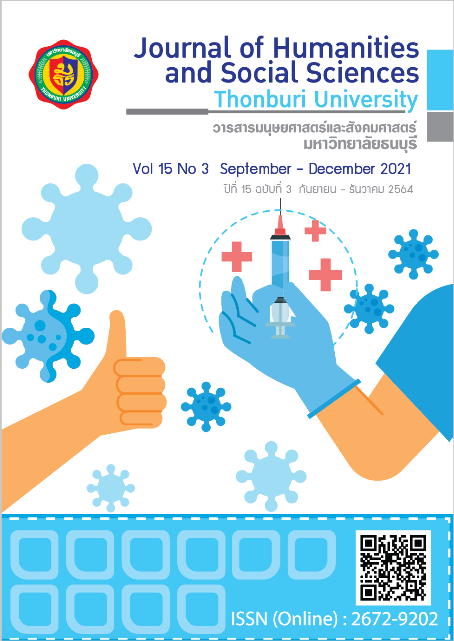A Framework of the Influence of Knowledge Management towards Creating the Innovation in Workplace and Job Satisfaction among the Staff in Private University in Bangkok
Keywords:
Job satisfaction, Innovation in workplace, Work engagement, Knowledge management, Organizational CommitmentAbstract
This academic article aims to purpose the influence of knowledge management towards creating the innovation in workplace and job satisfaction among the staff in private university in Bangkok, Thailand by considering the work engagement, knowledge management, and organizational commitment to explain the impact of job innovation in workplace and satisfaction. This academic article considered frontline staff who served and participated with the students directly as a targeted sample and purposes the objectives based on a framework of the Influence of knowledge management towards creating the innovation in workplace and job satisfaction among the staff in private university in Bangkok.
References
ชนาธิป ลีนิน. (2564). การจัดการความรู้คืออะไร : KM?. สืบค้นเมื่อ 15 กุมภาพันธ์ 2564, จาก http://ks.rmutsv.ac.th/th/whatiskm.
นวัตกรรมการศึกษา. (2564). นวัตกรรมการศึกษา. สืบค้นเมื่อ 15 กุมภาพันธ์ 2564, จาก http://innovationforeducation.weebly.com/35883623363436173626363535883633359
สารานุกรมไทยสำหรับเยาวชนฯ. (2564). สารานุกรมไทยสำหรับเยาวชนฯ. สืบค้นเมื่อ 5 มีนาคม 2564, จาก https://www.saranukromthai.or.th/sub/book/book.php?book=38&chap=3&page=t38-3-infodetail09.html
สำนักงานคณะกรรมการการอุดมศึกษา. (2564). สำนักงานคณะกรรมการการอุดมศึกษา. สืบค้นเมื่อ 1 มีนาคม 2564, จาก http://www.mua.go.th/university-2.html
สุดาพร ทองสวัสดิ์, ประชุม รอดประเสริฐ; และ นิรันดร์ จุลทรัพย์. (2563). สภาพ ปัญหาและแนวทางการพัฒนาความผูกพันต่อองค์การของอาจารย์ประจํามหาวิทยาลยเอกชนในประเทศไทย. วารสารวิชาการ สถาบันเทคโนโลยีแห่งสุวรรณภูมิ, 6(2), 354-368.
Allen, N. J., & Meyer, J. P. (1996). Affective, continuance, and normative commitment to the organization: An examination of construct validity. Journal of vocational behavior, 49(3), 252-276.
Al-Najjar, S. M., & Jawad, M. K. (2020). Exploration of Organizational Commitment and Job Satisfaction of Faculty Members in Private Higher Education. Business and Management Research, 9(1), 9-20.
Ampofo, E. T. (2020). Mediation effects of job satisfaction and work engagement on the relationship between organisational embeddedness and affective commitment among frontline employees of star–rated hotels in Accra. Journal of Hospitality and Tourism Management, 44, 253-262.
Arif, F. T., & Rahman, S. A. (2018). Knowledge management and job satisfaction. International Journal of Academic Research in Business and Social Sciences, 8(9), 266-274.
Demir, M., Guney, S., Akyurek, S., Ugural, M., & Aslan, I. (2017). Effect of managers’ organizational justice understanding on the level of employees’ organizational commitment and job satisfaction. Revista de Cercetare si Interventie Sociala.
Gomes, C., Curral, L., & Caetano, A. (2015). The mediating effect of work engagement on the relationship between self-leadership and individual innovation. International Journal of Innovation Management,, 19(1).
Honarpour, A., Jusoh, A., & Md Nor, K. (2012). Knowledge management, total quality management and innovation: A new look. Journal of technology management & innovation, 7(3), 22-31.
Iranmanesh, M., Zailani, S., Moeinzadeh, S., & Nikbin, D. (2017). Effect of green innovation on job satisfaction of electronic and electrical manufacturers’ employees through job intensity: personal innovativeness as moderator. Review of managerial science, 11(2), 299-313.
Jensen, K. W., Liu, Y., & Schøtt, T. (2017). Entrepreneurs innovation bringing job satisfaction, work-family balance, and life satisfaction: In China and around the world. International Journal of Innovation Studies, 1(4), 193-206.
Koseoglu, M. A., Bektas, C., Parnell, J. A., & Carraher, S. (2010). Knowledge management, organisational communication and job satisfaction: An empirical test of a five-star hotel in Turkey. International Journal of Leisure and Tourism Marketing, 1(4), 323-343.
Lai, Y. L., Hsu, M. S., Lin, F. J., Chen, Y. M., & Lin, Y. H. (2014). The effects of industry cluster knowledge management on innovation performance. Journal of Business Research, 67(5), 734-739.
Locke, E. A. (1969). What is job satisfaction? Organizational behavior and human performance, 4(4), 309-336.
Meng, J., & Berger, B. K. (n.d.). The impact of organizational culture and leadership performance on PR professionals’ job satisfaction: Testing the joint mediating effects of engagement and trust. Public Relations Review, 45(1), 64-75.
Nikpour, A. (2018). Psychological empowerment and organizational innovation: mediating role of job satisfaction and organizational commitment. International Journal of Organizational Leadership, 7, 106-119.
Park, Y. K., Song, J. H., Yoon, S. W., & Kim, J. (n.d.). Learning organization and innovative behavior: The mediating effect of work engagement. European Journal of Training and Development.
Schaufeli, W. B., Bakker, A. B., & Salanova, M. (2006). The measurement of work engagement with a short questionnaire: A cross-national study. Educational and psychological measurement, 66(4), 701-716.
Singh, A. K., & Sharma, V. (n.d.). Knowledge management antecedents and its impact on employee satisfaction. The Learning Organization.
Straw, E. M. (2013). Construction of a conceptualization of personal knowledge within a knowledge management perspective using grounded theory methodology.
Tongsawat, S., Rodprasert, P., & Jullasub, N. (2563). States, Problems and Developing Guidelines of Academic Staffs Organization Commitment of the Private Universities in Thailand. Journal of Suvarnabhumi Institute, 354-368.
Wipulanusat, W., Kokkaew, N., Parnphumeesup, P., & Sunkpho, J. (2019). Exploratory and confirmatory factor analysis of measurement scale for psychological attachment to an organization. WMS Journal of Management, 8(3), 1-11.
Zaabi, H. A., Singh, S. K., & Ajmal, M. M. (2017). Role of organisational commitment, culture and leadership in managing innovation: a study. International Journal of Value Chain Management, 8(3), 270-284.
Translated Thai References
Education for Innovation. (2021). Education for Innovation. Retrieved February 15, 2021, from http://innovationforeducation.weebly.com/358836233634361736263635358836333597 (in Thai)
Leenin, C. (2021). What is Knowledge manage: KM?. Retrieved February 15, 2021, from http://ks.rmutsv.ac.th/th/whatiskm (in Thai)
Office of the Higher Education Commission. (2021). Office of the Higher Education Commission. Retrieved March 1, 2021, from http://www.mua.go.th/university-2.html (in Thai)
Thai Encyclopedia for Youth. (2021). Thai Encyclopedia for Youth/. Retrieved March 5, 2021, from https://www.saranukromthai.or.th/sub/book/book.php?book=38&chap=3&page=t38-3-infodetail09 (in Thai)







